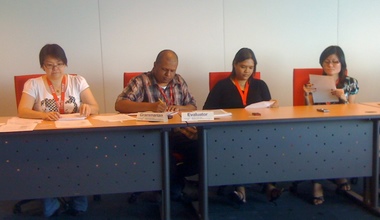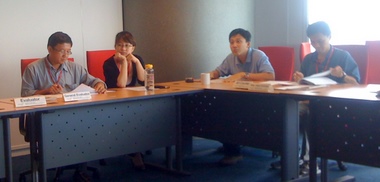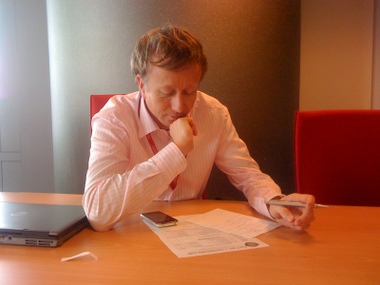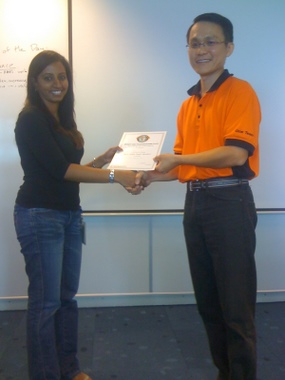"Just what is the purpose of the Toastmasters Clubs?" said a man to me the other day as we talked about his becoming a member. "Is it just to teach men to face an audience, or is there something more to it than that?"
 His question is not an unusual one, and is one that should be considered by every member, for it not only has its bearing on immediate matters, but definitely concerns the problem of continuous membership and the values of persistence.
His question is not an unusual one, and is one that should be considered by every member, for it not only has its bearing on immediate matters, but definitely concerns the problem of continuous membership and the values of persistence.
The obvious purpose is to help men overcome the fear of the audience, gain facility in speech and learn how to express themselves clearly and concisely, but this is really a minor consideration in the minds of those who more adequately understand the possibilities of the work. The fundamental thing is to develop personality. Self-expression of any constructive sort helps in the integration of character, in the building of personality and in the discovery and conservation of latent abilities. No kind of self-expression is more effective to these ends than that involved in public speech.
My own interest in the Toastmasters Clubs would be very much less if learning to make a speech represented the ultimate value in it. I have been led to give thought and energy to the promotion of Toastmasters because I have learned, through many years of experience, that it affords the finest and most efficient means for bringing out and developing the very best that is in men. If I were to become personal I could name scores whose individual histories prove this assertion - men whose lives have been enriched, whose ability to serve has been increased, whose talents have been discovered, whose mental horizons have been extended, all because of the opportunity for personal development which they have found in the simple but effective program of the Toastmasters Club.
Better speaking certainly -- but that's only the beginning!
Much of this is beyond the present thinking of the newer clubs, but it must always be borne in mind that the fundamental motive of our movement is to make men better citizens, better Christians, better members of the human brotherhood by teaching them to use the best that is in them. This process of personality development is not one that can be carried through in a short time. A man can spend six months as a member of a Toastmasters Club and then drop out, feeling that he has learned to make a pretty good speech. Many, to their own detriment, do just this. Perhaps such a man has gained what he wants, but he totally missed our real purpose, and he has failed to take advantage of the opportunity to gain for himself a priceless endowment of moral and spiritual growth. It is the man who persists through the years who finds the genuine treasure in the Toastmasters idea.
I have in mind one man who joined one of the clubs a number of years ago. He showed quick improvement. He became an excellent speaker, and in the course of a year, other things intervening, dropped out, counting himself to have achieved success. After an interval of more than a year, he came back again and started in earnest on the quest for something, the exact nature of which he did not understand, but which he wanted. The result today, after persistent application for more than two years, is that this man has arrived at the place of true mastery, both of his speaking ability and of his own self. He has discovered new realms in his own mind which he had never known before. He has made himself far more than a speaker- he is a thinker. In his service to the community he is a new man. In his own business he has won advancement. His life means more to him and to his environment than it could ever have meant without some such stimulating, guiding influence as he has found in the Toastmasters Club.
This experience is typical of many who have stayed with the work. It is the best argument I know for long-continued membership, and it is a convincing testimonial to the mental, spiritual and social values of the movement.
When we think of the purpose of the Toastmasters Club let us remember that there are two rather distinct groups of purposes. The first is the superficial one, of helping men to learn to make better speeches. The second is the fundamental one, of helping men to build themselves into the very best of which they are capable. The first can be achieved in a comparatively short time. The second is a work of years - of a lifetime. Both purposes are worthy, but the second is the one that really counts.
This article, written by Toastmasters founder Ralph Smedley, was originally published in the December 1935 issue of The Toastmaster. It was published again on the 70th Anniversary of Toastmasters International in the October 1994 issue of The Toastmaster.



 His question is not an unusual one, and is one that should be considered by every member, for it not only has its bearing on immediate matters, but definitely concerns the problem of continuous membership and the values of persistence.
His question is not an unusual one, and is one that should be considered by every member, for it not only has its bearing on immediate matters, but definitely concerns the problem of continuous membership and the values of persistence.






